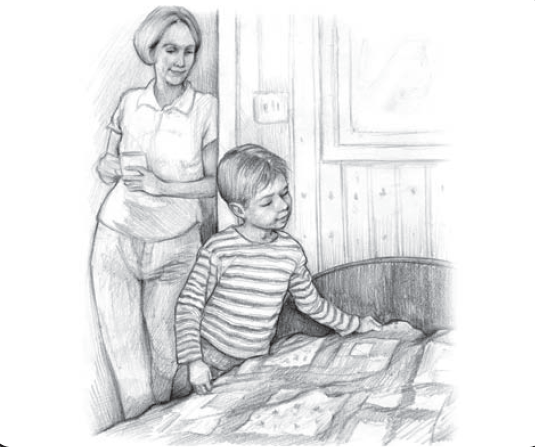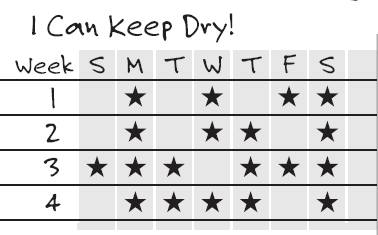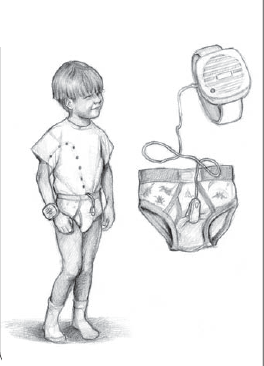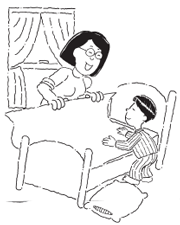Medical Conditions
Bedwetting
Print, Share, or View Spanish version of this article
 Most children learn to use the toilet between 2 and 4 years of age. Even after children are toilet-trained, they may wet the bed until they are older. It’s even common for 6-year-olds to wet the bed once in a while. Some children still wet the bed at age 12.
Most children learn to use the toilet between 2 and 4 years of age. Even after children are toilet-trained, they may wet the bed until they are older. It’s even common for 6-year-olds to wet the bed once in a while. Some children still wet the bed at age 12.
What to Do About Bedwetting
Bedwetting usually goes away as your child gets older. Talk with the doctor if you or your child are worried about bedwetting. These tips can help in the meantime.
Try These Tips
-
Protect the bed. Put a plastic cover under the sheets.
-
Have your child use the toilet just before bedtime.
-
Don’t give your child soda pop (especially cola) before bed.
-
Wake your child up to use the toilet 1 or 2 hours after going to sleep. This will help him or her stay dry through the night.
-
Reward your child for dry nights. Try a star chart. (See “Using a Star Chart” on the right.) Do not punish your child for wet nights.
-
Let your child help change wet sheets and covers. But don’t force your child to do this. If you do, your child will think he or she is being punished.
-
Set a no-teasing rule in your family. Let others know that it’s not the child’s fault.
-
Don’t make bedwetting a big issue so your child won’t either.
Tell Your Child
-
Wetting the bed is not his or her fault.
-
It won’t last forever.
-
Lots of kids go through this, but no one talks about it at school.
Using a Star Chart
 Try using a calendar and star-shaped stickers to keep track of your child’s “dry” nights. Each morning, check your child’s bed. If it stayed dry all night, praise your child. Let him or her put a sticker on the calendar for that day. (You can also make a chart that shows the days of the week. See the chart above.)
Try using a calendar and star-shaped stickers to keep track of your child’s “dry” nights. Each morning, check your child’s bed. If it stayed dry all night, praise your child. Let him or her put a sticker on the calendar for that day. (You can also make a chart that shows the days of the week. See the chart above.)
For many children, just seeing the stars add up is enough. Other children may need a reward. For example, do something special with your child after a whole week of dry nights.
If You Need More Help…
Try the tips on the first page of this handout for 1 to 3 months. Then, talk with your child’s doctor if bedwetting is still a problem. The doctor may suggest one of the following:
A Bedwetting Alarm
 You can use a bedwetting alarm. The alarm goes off when it gets wet. Then the child learns to wake up to use the toilet. Over time, this helps a child stay dry at night. But don’t give up. It can take weeks or months to work.
You can use a bedwetting alarm. The alarm goes off when it gets wet. Then the child learns to wake up to use the toilet. Over time, this helps a child stay dry at night. But don’t give up. It can take weeks or months to work.
Bedwetting alarms tend to work best for children who have some dry nights. Ask your child’s doctor what kind of alarm would be best for your child.
Medicine
There are some medicines for treating bedwetting in older children. They almost
Reasons for Bedwetting
We don’t always know what causes bedwetting. Here are some possible reasons:
-
There is a family history of bedwetting. (Most children who wet the bed have at least one parent who did it as a child.)
-
Your child is a deep sleeper and doesn’t wake up when he or she has to pee.
-
Your child’s bladder
* is still too small to hold urine all night. -
Your child has trouble passing stool (poop). This can put pressure on the bladder.
-
Your child has a minor illness, is very tired, or is going through changes or stress at home.
Signs of a Health Problem
Talk with your child’s doctor if:
-
Your child has been completely toilet-trained for more than 6 months AND
-
Your child starts wetting the bed again.
These 2 things together
Bedwetting: What Parents Need to Know
Print, Share, or View Spanish version of this article
 Did you know that there are about 5 million children in the United States who wet the bed? If your child wets the bed, he or she is not alone.
Did you know that there are about 5 million children in the United States who wet the bed? If your child wets the bed, he or she is not alone.
Though most children are toilet trained between 2 and 4 years of age, some children may not be able to stay dry at night until they are older. Children develop at their own rate. For example, 20% of 5-year-olds, 10% of 7-year-olds, and 5% of 10-year-olds may still wet the bed.
Bedwetting is not a serious medical condition, but it can be a challenging problem for children and parents. Read on to find out more from the American Academy of Pediatrics about bedwetting and what can be done about it.
Causes of bedwetting
Although not all of the causes of bedwetting are fully understood, the following are some that are possible:
-
Your child is a deep sleeper and does not awaken to the signal of a full bladder.
-
Your child has not yet learned how to hold and empty urine well. (Communication between the brain and bladder may take time to develop.)
-
Your child’s body makes too much urine at night.
-
Your child is constipated. Full bowels can put pressure on the bladder and lead to problems with holding and emptying urine well.
-
Your child has a minor illness, is overly tired, or is responding to changes or stresses going on at home.
-
There is a family history of bedwetting. Most children who wet the bed have at least one parent who had the same problem as a child.
-
Your child’s bladder is small or not developed enough to hold urine for a full night.
-
Your child has an underlying medical problem.
What you can do
Most children wet their beds during toilet training. Even after they stay dry at night for a number of days or even weeks, they may start wetting at night again. If this happens to your child, simply go back to training pants at night and try again another time. The problem usually disappears as children get older. If children reach school age and still have problems wetting the bed, it most likely means they have never developed nighttime bladder control.
If you are concerned about your child’s bedwetting or your child expresses concern, talk with your child’s doctor. You may be asked the following questions about your child’s bedwetting:
-
Is there a family history of bedwetting?
-
How often and when does your child urinate during the day?
-
Have there been any changes in your child’s home life such as a new baby, divorce, or new house?
-
Does your child drink carbonated beverages, caffeine, citrus juices, or a lot of water before bed?
-
Is there anything unusual about how your child urinates or the way the urine looks?
Signs of a medical problem
If your child has been completely toilet trained for 6 months or longer and suddenly begins wetting the bed, talk with your child’s doctor. It may be a sign of a medical problem. However, most medical problems that cause bedwetting to recur suddenly have other signs, including
-
Changes in how much and how often your child urinates during the day
-
Pain, burning, or straining while urinating
-
A very small or narrow stream of urine or dribbling that is constant or happens just after urination
-
Cloudy or pink urine or bloodstains on underpants
-
Daytime and nighttime wetting
-
Sudden change in personality or mood
-
Poor bowel control
-
Urinating after stress (coughing, running, or lifting)
-
Certain gait disturbances (problems with walking that may mean an underlying neurologic problem)
-
Continuous dampness
If your child has any of these signs, your child’s doctor may want to take a closer look at the kidneys or bladder. If necessary, your child’s doctor will refer you to a pediatric urologist, a doctor who is specially trained to treat children’s urinary problems.
Managing bedwetting
Keep the following tips in mind when dealing with bedwetting:
-
Do not blame your child. Remember that it is not your child’s fault. (See “Causes of bedwetting.”)
-
Be honest with your child about what is going on. Let your child know it’s not his or her fault and that most children outgrow bedwetting.
-
Be sensitive to your child’s feelings. If you don’t make a big issue out of bedwetting, chances are your child won’t either. Also remind your child that other children wet the bed.
-
Protect the bed. A plastic cover under the sheets protects the mattress from getting wet and smelling like urine.
-
Let your child help. Encourage your child to help change the wet sheets and covers. This teaches responsibility. It can also keep your child from feeling embarrassed if the rest of the family knows. However, if your child sees this as punishment, it is not recommended.
-
Set a no-teasing rule in your family. Do not let family members, especially siblings, tease your child. Let them know that it’s not your child’s fault.
-
Take steps before bedtime. Have your child use the toilet and avoid drinking large amounts of fluid just before bedtime.
-
Try to wake your child up to use the toilet 1 to 2 hours after going to sleep to help your child stay dry through the night.
-
Be positive. Reward your child for dry nights. Offer support, not punishment, for wet nights.
-
Be aware of your child’s daily urine and bowel habits.
Bedwetting alarms
If your child is still not able to stay dry during the night after using these steps for 1 to 3 months, a bedwetting alarm may be recommended. When a bedwetting alarm senses urine, it sets off an alarm so the child can wake up to use the toilet. When used correctly, it will detect wetness right away and sound the alarm. Be sure your child resets the alarm before going back to sleep.
Bedwetting alarms are successful 50% to 75% of the time. They tend to be most helpful for children who are deep sleepers and have some bladder control on their own. Ask your child’s doctor which type of alarm would be best for your child.
Medicines
Medicines are available to treat bedwetting for children 6 years and older. Though medicines rarely cure bedwetting, they may be helpful, especially when children begin attending sleepovers or overnight camps. Your child’s doctor can tell you more about these medicines and if they are right for your child. Remember to ask about possible side effects.
Beware of “cures”
There are many treatment programs and devices that claim they can “cure” bedwetting. Be careful; many of these products make false claims and promises and may be very expensive. Your child’s doctor is the best source for advice about bedwetting. Talk with your child’s doctor before starting any treatment program.
Stay positive
Do not be discouraged if one treatment does not work. Some children will respond well to a combination of treatments involving medicines and bedwetting alarms. This often involves care by a pediatric specialist. (If your child is one of a small number of children who do not respond to any treatment, talk with your child’s doctor about ways to manage bedwetting.)
Also, in most cases, bedwetting decreases as the child’s body matures. By the teen years, almost all children outgrow bedwetting. Only about 2% to 3% of children continue to have problems with bedwetting as adults.
Until your child outgrows bedwetting, your child will need a lot of emotional support from your family. Support from your child’s doctor, pediatric urologist, or mental health professional also can help.



